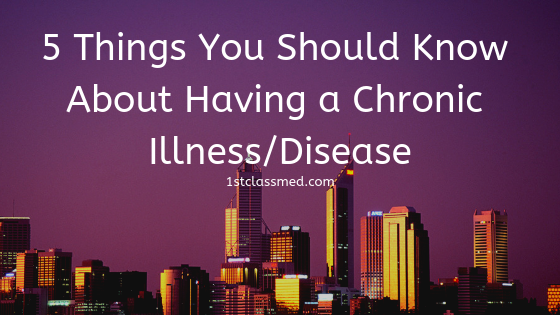
In February of this year an article was posted by The New York Times about the hidden difficulties some face when dealing with a chronic illness.
After reading the article, we felt it was important to address and reiterate the points made in the article, as well as how to deal with them.
No matter where you are in your disease or chronic illness, it is important to prepare for any of these issues and have a plan to overcome them.
There are many road blocks you may run into once diagnosed with your chronic illness or disease, but there are also solutions.
- Mentality is Key
- Issue: for many with a disease or chronic illness the mental aspect can do the most damage. Even after a disease or chronic illness is under control from medications or treatment, the mental pain may not have subsided. Many mental issues span from finances, death and disability and can cause anxiety for many. This fear can lead to many not getting any medical treatment that may be needed.
- Solution: it is important to know that you are not alone, and someone out
 there feels how you feel. It is also important to know that there are people who can help as seeking therapy can decrease the risk of depression. As for finances, it can feel like a brick wall in your way, but many companies and hospitals provide payment plans for those who need it. Any stress you may feel over finances, speak with your doctor to figure out what can be done. Death and disability can be scary to think about but focusing on that takes away from the life you are living now.
there feels how you feel. It is also important to know that there are people who can help as seeking therapy can decrease the risk of depression. As for finances, it can feel like a brick wall in your way, but many companies and hospitals provide payment plans for those who need it. Any stress you may feel over finances, speak with your doctor to figure out what can be done. Death and disability can be scary to think about but focusing on that takes away from the life you are living now. - Relationship Changes
- Issue: it can be a burden on your friend and family when you feel you cannot go out like everyone else. You may feel like you are disappointing everyone because you can’t go out. It is possible that you feel like you have to give up your goals and dreams because you may not be able to attain them anymore. You overall feel things changing and you may feel that you are unable to keep up.
- Solution: though relationships may change, no one will love you less. It can be difficult to go out every weekend with friend or family, but you can always see if they just want to come over. By explaining to your loved ones the issues you may face when going out, they may have a solution to make it easier on you. You may have to make adjustments in life to reach your goals, but it doesn’t mean you need to give up on them. Seeking a therapist or psychologist can help you figure out how you need to go about reaching your goals.
- Take Advice with a Grain of Salt
- Issue: a lot of people will tell you how to get better or say that you are okay in the first place. Everyone thinks they have a cure for you, or you weren’t sick at all. This can be stressful for you, because it seems that no one believes you. This can be discouraging that many around you may not believe that you are truly sick.
- Solution: though it can be disheartening to hear others say you seem okay, but don’t listen to them. You are the only one who knows your pain and your disease, other opinions should be taken with a grain of salt. For many diseases and chronic illnesses, there is no known cure, so other recommendation probably won't cure you either. Many scientists are looking for cures for thousands of diseases and chronic illnesses, but it isn’t likely that the person you are talking to is one of them. If they do not have a medical degree, it is best to disregard what they are saying.
- Stay Educated, and Educate Others too
- Issue: as you are first diagnosed, your doctor will most likely explain what your disease or chronic illness is, but you may not be paying attention but focusing on the diagnosis itself. You may be in shock and are unable to fully comprehend what the doctor is saying. You may have friends and family that do not understand your condition and haven’t done the research to understand it as well.
- Solution: once diagnosed, your first goal should be to head home and do your own research on your diagnosis. You should become an expert on your condition, as its something you will have to deal with the rest of your life. A lot of friends and family will need to learn about your condition, and you will have to be the one to teach them. It is important to discuss your disease or chronic illness, don’t feel like you are unable to discuss it with others. It is important for those around you to know about your condition and understand it.
- Lean on Others
- Issue: living with a disease or chronic illness can make you feel alone or separate from others. You may feel like those around you do not know what you are going through, and it can be difficult. It may seem like you have no one else, but that is far from the case. Nearly 6 out of every 10 Americans live with a minimum of one chronic condition.
- Solution: researching online can help you find local or online support groups of people who you can relate to. Finding groups of people going through the
 same thing as you, but in different stages, can help you learn more as well as teach others. These groups can help you overcome any barriers in your way, as some in the group may have already dealt with the same issue. You can also help others get through issues that you have already dealt with. No matter what, it is important to stay social and do not let yourself shut down and isolate yourself from others.
same thing as you, but in different stages, can help you learn more as well as teach others. These groups can help you overcome any barriers in your way, as some in the group may have already dealt with the same issue. You can also help others get through issues that you have already dealt with. No matter what, it is important to stay social and do not let yourself shut down and isolate yourself from others.
Conclusion:
It can seem like a lot of things are tearing you down after a diagnosis, but there are solutions to problems you may encounter.
If you experience any of the above issues, speaking with your doctor or a therapist about how you feel can help find a solution that works for you.
No matter what, there are ways to grow past issues you encounter after a diagnosis, specifically by reaching out for help.



